Department+of+mechanical+engineering
-
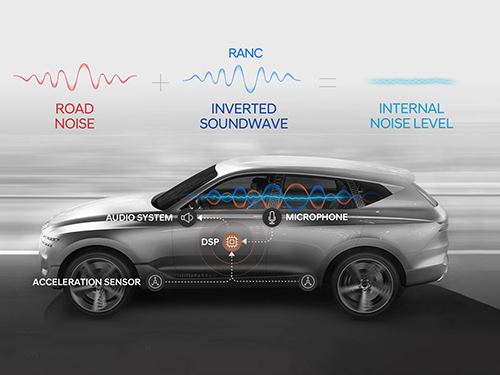 A System Controlling Road Active Noise to Hit the Road
The research team led by Professor Youngjin Park of the Department of Mechanical Engineering has developed a road noise active noise control (RANC) system to be commercialized in partnership with Hyundai Motor Group.
On December 11, Hyundai Motor Group announced the successful development of the RANC system, which significantly reduces the road noise flowing into cars. The carmaker has completed the domestic and American patent applications for the location of sensors and the signal selection method, the core technology of RANC.
RANC is a technology for reducing road noise during driving. This system consists of an acceleration sensor, digital signal processor (the control computer to analyze sound signals), microphone, amplifier, and audio system. To make the system as simple as possible, the audio system utilizes the original audio system embedded in the car instead of a separate system.
The acceleration sensor first calculates the vibration from the road into the car. The location of the sensor is important for accurately identifying the vibration path. The research team was able to find the optimal sensor location through a number of tests.
The System Dynamics and Applied Control Laboratory of Professor Park researched ways to significantly reduce road noise with Hyundai Motor Group for four years from 1993 as a G7 national project and published the results in international journals. In 2002, the researchers published an article titled “Noise Quietens Driving” in Nature, where they announced the first success in reducing road noise in actual cars. The achievement did not lead to commercialization, however, due to the lack of auxiliary technologies at the time, digital amplifiers and DSP for cars for example, and pricing issues.
Since 2013, Professor Park’s research team has participated in one technology transfer and eight university-industry projects. Based on these efforts, the team was able to successfully develop the RANC system with domestic technology in partnership with Hyundai’s NVH Research Lab (Research Fellow, Dr. Gangdeok Lee; Ph.D. in aviation engineering, 1996), Optomech (Founder, Professor Gyeongsu Kim; Ph.D. in mechanical engineering, 1999), ARE (CEO Hyeonseok Kim; Ph.D. in mechanical engineering, 1998), WeAcom, and BurnYoung.
Professor Park’s team led the project by performing theory-based research during the commercialization stage in collaboration with Hyundai Motor Group.
For the commercialization of the RANC system, Hyundai Motor Group is planning to collaborate with the global car audio company Harman to increase the degree of completion and apply the RANC system to the GV 80, the first SUV model of the Genesis brand.
“I am very delighted as an engineer to see the research I worked on from my early days at KAIST be commercialized after 20 years,” noted Professor Park. “I am thrilled to make a contribution to such commercialization with my students in my lab.”
2019.12.27 View 14053
A System Controlling Road Active Noise to Hit the Road
The research team led by Professor Youngjin Park of the Department of Mechanical Engineering has developed a road noise active noise control (RANC) system to be commercialized in partnership with Hyundai Motor Group.
On December 11, Hyundai Motor Group announced the successful development of the RANC system, which significantly reduces the road noise flowing into cars. The carmaker has completed the domestic and American patent applications for the location of sensors and the signal selection method, the core technology of RANC.
RANC is a technology for reducing road noise during driving. This system consists of an acceleration sensor, digital signal processor (the control computer to analyze sound signals), microphone, amplifier, and audio system. To make the system as simple as possible, the audio system utilizes the original audio system embedded in the car instead of a separate system.
The acceleration sensor first calculates the vibration from the road into the car. The location of the sensor is important for accurately identifying the vibration path. The research team was able to find the optimal sensor location through a number of tests.
The System Dynamics and Applied Control Laboratory of Professor Park researched ways to significantly reduce road noise with Hyundai Motor Group for four years from 1993 as a G7 national project and published the results in international journals. In 2002, the researchers published an article titled “Noise Quietens Driving” in Nature, where they announced the first success in reducing road noise in actual cars. The achievement did not lead to commercialization, however, due to the lack of auxiliary technologies at the time, digital amplifiers and DSP for cars for example, and pricing issues.
Since 2013, Professor Park’s research team has participated in one technology transfer and eight university-industry projects. Based on these efforts, the team was able to successfully develop the RANC system with domestic technology in partnership with Hyundai’s NVH Research Lab (Research Fellow, Dr. Gangdeok Lee; Ph.D. in aviation engineering, 1996), Optomech (Founder, Professor Gyeongsu Kim; Ph.D. in mechanical engineering, 1999), ARE (CEO Hyeonseok Kim; Ph.D. in mechanical engineering, 1998), WeAcom, and BurnYoung.
Professor Park’s team led the project by performing theory-based research during the commercialization stage in collaboration with Hyundai Motor Group.
For the commercialization of the RANC system, Hyundai Motor Group is planning to collaborate with the global car audio company Harman to increase the degree of completion and apply the RANC system to the GV 80, the first SUV model of the Genesis brand.
“I am very delighted as an engineer to see the research I worked on from my early days at KAIST be commercialized after 20 years,” noted Professor Park. “I am thrilled to make a contribution to such commercialization with my students in my lab.”
2019.12.27 View 14053 -
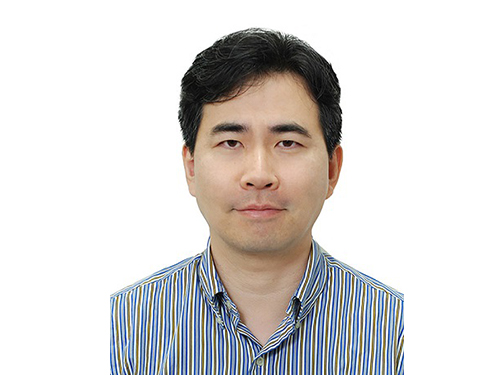 Professor Sung Yong Kim Elected as the Chair of PICES MONITOR
< Professor Sung Yong Kim >
Professor Sung Yong Kim from the Department of Mechanical Engineering was elected as the chair of the Technical Committee on Monitoring (MONITOR) of the North Pacific Marine Science Organization (PICES).
PICES is an intergovernmental marine science organization that was established in 1992 through a collaboration between six North Pacific nations including South Korea, Russia, the United States, Japan, China, and Canada to exchange and discuss research on the Pacific waters. Its headquarters is located in Canada and the organization consists of seven affiliated maritime science and marine technology committees.
Professor Kim was elected as the chair of the technical committee that focuses on monitoring and will be part of the Science Board as an ex-officio member. His term will last three years from November 2019.
Professor Kim was recognized for his academic excellence, expertise, and leadership among oceanographers both domestically and internationally.
Professor Kim will also participate as an academia civilian committee member of the Maritime and Fisheries Science and Technology Committee under the Korean Ministry of Oceans and Fisheries for two years from December 18, 2019.
He stated, “I will give my full efforts to broaden Korean oceanography research by participating in maritime leadership positions at home and abroad, and help South Korea become a maritime powerhouse.”
(END)
2019.12.22 View 12051
Professor Sung Yong Kim Elected as the Chair of PICES MONITOR
< Professor Sung Yong Kim >
Professor Sung Yong Kim from the Department of Mechanical Engineering was elected as the chair of the Technical Committee on Monitoring (MONITOR) of the North Pacific Marine Science Organization (PICES).
PICES is an intergovernmental marine science organization that was established in 1992 through a collaboration between six North Pacific nations including South Korea, Russia, the United States, Japan, China, and Canada to exchange and discuss research on the Pacific waters. Its headquarters is located in Canada and the organization consists of seven affiliated maritime science and marine technology committees.
Professor Kim was elected as the chair of the technical committee that focuses on monitoring and will be part of the Science Board as an ex-officio member. His term will last three years from November 2019.
Professor Kim was recognized for his academic excellence, expertise, and leadership among oceanographers both domestically and internationally.
Professor Kim will also participate as an academia civilian committee member of the Maritime and Fisheries Science and Technology Committee under the Korean Ministry of Oceans and Fisheries for two years from December 18, 2019.
He stated, “I will give my full efforts to broaden Korean oceanography research by participating in maritime leadership positions at home and abroad, and help South Korea become a maritime powerhouse.”
(END)
2019.12.22 View 12051 -
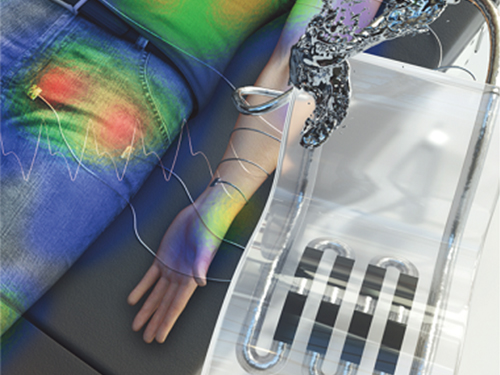 New Liquid Metal Wearable Pressure Sensor Created for Health Monitoring Applications
Soft pressure sensors have received significant research attention in a variety of fields, including soft robotics, electronic skin, and wearable electronics. Wearable soft pressure sensors have great potential for the real-time health monitoring and for the early diagnosis of diseases.
A KAIST research team led by Professor Inkyu Park from the Department of Mechanical Engineering developed a highly sensitive wearable pressure sensor for health monitoring applications. This work was reported in Advanced Healthcare Materials on November 21 as a front cover article.
This technology is capable of sensitive, precise, and continuous measurement of physiological and physical signals and shows great potential for health monitoring applications and the early diagnosis of diseases.
A soft pressure sensor is required to have high compliance, high sensitivity, low cost, long-term performance stability, and environmental stability in order to be employed for continuous health monitoring. Conventional solid-state soft pressure sensors using functional materials including carbon nanotubes and graphene have showed great sensing performance. However, these sensors suffer from limited stretchability, signal drifting, and long-term instability due to the distance between the stretchable substrate and the functional materials.
To overcome these issues, liquid-state electronics using liquid metal have been introduced for various wearable applications. Of these materials, Galinstan, a eutectic metal alloy of gallium, indium, and tin, has great mechanical and electrical properties that can be employed in wearable applications. But today’s liquid metal-based pressure sensors have low-pressure sensitivity, limiting their applicability for health monitoring devices.
The research team developed a 3D-printed rigid microbump array-integrated, liquid metal-based soft pressure sensor. With the help of 3D printing, the integration of a rigid microbump array and the master mold for a liquid metal microchannel could be achieved simultaneously, reducing the complexity of the manufacturing process. Through the integration of the rigid microbump and the microchannel, the new pressure sensor has an extremely low detection limit and enhanced pressure sensitivity compared to previously reported liquid metal-based pressure sensors. The proposed sensor also has a negligible signal drift over 10,000 cycles of pressure, bending, and stretching and exhibited excellent stability when subjected to various environmental conditions.
These performance outcomes make it an excellent sensor for various health monitoring devices. First, the research team demonstrated a wearable wristband device that can continuously monitor one’s pulse during exercise and be employed in a noninvasive cuffless BP monitoring system based on PTT calculations. Then, they introduced a wireless wearable heel pressure monitoring system that integrates three 3D-BLiPS with a wireless communication module.
Professor Park said, “It was possible to measure health indicators including pulse and blood pressure continuously as well as pressure of body parts using our proposed soft pressure sensor. We expect it to be used in health care applications, such as the prevention and the monitoring of the pressure-driven diseases such as pressure ulcers in the near future. There will be more opportunities for future research including a whole-body pressure monitoring system related to other physical parameters.”
This work was supported by a National Research Foundation of Korea (NRF) grant funded by the Ministry of Science and ICT.
< Figure 1. The front cover image of Advanced Healthcare Materials, Volume 8, Issue 22. >
< Figure 2. Highly sensitive liquid metal-based soft pressure sensor integrated with 3D-printed microbump array. >
< Figure 3. High pressure sensitivity and reliable sensing performances of the proposed sensor and wireless heel pressure monitoring application. >
-ProfileProfessor Inkyu ParkMicro/Nano Transducers Laboratoryhttp://mintlab1.kaist.ac.kr/
Department of Mechanical EngineeringKAIST
2019.12.20 View 17177
New Liquid Metal Wearable Pressure Sensor Created for Health Monitoring Applications
Soft pressure sensors have received significant research attention in a variety of fields, including soft robotics, electronic skin, and wearable electronics. Wearable soft pressure sensors have great potential for the real-time health monitoring and for the early diagnosis of diseases.
A KAIST research team led by Professor Inkyu Park from the Department of Mechanical Engineering developed a highly sensitive wearable pressure sensor for health monitoring applications. This work was reported in Advanced Healthcare Materials on November 21 as a front cover article.
This technology is capable of sensitive, precise, and continuous measurement of physiological and physical signals and shows great potential for health monitoring applications and the early diagnosis of diseases.
A soft pressure sensor is required to have high compliance, high sensitivity, low cost, long-term performance stability, and environmental stability in order to be employed for continuous health monitoring. Conventional solid-state soft pressure sensors using functional materials including carbon nanotubes and graphene have showed great sensing performance. However, these sensors suffer from limited stretchability, signal drifting, and long-term instability due to the distance between the stretchable substrate and the functional materials.
To overcome these issues, liquid-state electronics using liquid metal have been introduced for various wearable applications. Of these materials, Galinstan, a eutectic metal alloy of gallium, indium, and tin, has great mechanical and electrical properties that can be employed in wearable applications. But today’s liquid metal-based pressure sensors have low-pressure sensitivity, limiting their applicability for health monitoring devices.
The research team developed a 3D-printed rigid microbump array-integrated, liquid metal-based soft pressure sensor. With the help of 3D printing, the integration of a rigid microbump array and the master mold for a liquid metal microchannel could be achieved simultaneously, reducing the complexity of the manufacturing process. Through the integration of the rigid microbump and the microchannel, the new pressure sensor has an extremely low detection limit and enhanced pressure sensitivity compared to previously reported liquid metal-based pressure sensors. The proposed sensor also has a negligible signal drift over 10,000 cycles of pressure, bending, and stretching and exhibited excellent stability when subjected to various environmental conditions.
These performance outcomes make it an excellent sensor for various health monitoring devices. First, the research team demonstrated a wearable wristband device that can continuously monitor one’s pulse during exercise and be employed in a noninvasive cuffless BP monitoring system based on PTT calculations. Then, they introduced a wireless wearable heel pressure monitoring system that integrates three 3D-BLiPS with a wireless communication module.
Professor Park said, “It was possible to measure health indicators including pulse and blood pressure continuously as well as pressure of body parts using our proposed soft pressure sensor. We expect it to be used in health care applications, such as the prevention and the monitoring of the pressure-driven diseases such as pressure ulcers in the near future. There will be more opportunities for future research including a whole-body pressure monitoring system related to other physical parameters.”
This work was supported by a National Research Foundation of Korea (NRF) grant funded by the Ministry of Science and ICT.
< Figure 1. The front cover image of Advanced Healthcare Materials, Volume 8, Issue 22. >
< Figure 2. Highly sensitive liquid metal-based soft pressure sensor integrated with 3D-printed microbump array. >
< Figure 3. High pressure sensitivity and reliable sensing performances of the proposed sensor and wireless heel pressure monitoring application. >
-ProfileProfessor Inkyu ParkMicro/Nano Transducers Laboratoryhttp://mintlab1.kaist.ac.kr/
Department of Mechanical EngineeringKAIST
2019.12.20 View 17177 -
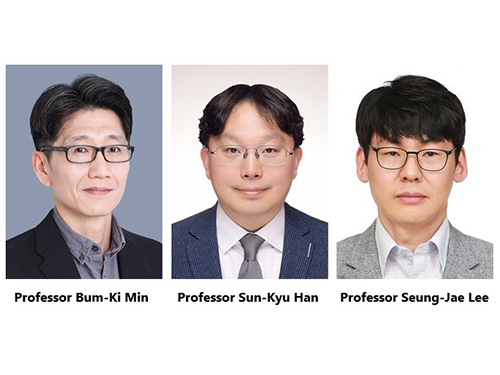 Three Professors Receive Han Sung Science Awards
Three KAIST professors swept the 2nd Han Sung Science Awards. Professor Bum-Ki Min from the Departments of Mechanical Engineering and Physics, Professor Sun-Kyu Han from the Department of Chemistry, and Professor Seung-Jae Lee from the Department of Biological Sciences won all three awards presented by the Han Sung Scholarship Foundation, which recognizes promising mid-career scientists in the fields of physics, chemistry, and biological sciences. The awards ceremony will take place on August 16 in Hwaseong.
Professor Min was declared as the winner of the physics field in recognition of his outstanding research activities including searching for new application areas for metamaterials and investigating their unexplored functionalities. The metamaterials with a high index of refraction developed by Professor Min’s research team have caught the attention of scientists worldwide, as they can help develop high-resolution imaging systems and ultra-small, hyper-sensitive optical devices.
The chemistry field winner, Professor Han, is the youngest awardee so far at 36 years of age. He is often described as one of the most promising next-generation Korean scientists in the field of the total synthesis of complex natural products. Given the fact that this field takes very long-term research, he is making unprecedented research achievements. He is focusing on convergent and flexible synthetic approaches that enable access to not only a single target but various natural products with structural and biosynthetic relevance as well as unnatural products with higher biological potency.
Professor Lee was recognized for his contributions to the advancement of biological sciences, especially in aging research. Professor Lee’s team is taking a novel approach by further investigating complex interactions between genetic and environmental factors that affect aging, and identifying genes that mediate the effects. The team has been conducting large-scale gene discovery efforts by employing RNA sequencing analysis, RNAi screening, and chemical mutagenesis screening. They are striving to determine the functional significance of candidate genes obtained from these experiments and mechanistically characterize these genes.
(END)
2019.07.03 View 11922
Three Professors Receive Han Sung Science Awards
Three KAIST professors swept the 2nd Han Sung Science Awards. Professor Bum-Ki Min from the Departments of Mechanical Engineering and Physics, Professor Sun-Kyu Han from the Department of Chemistry, and Professor Seung-Jae Lee from the Department of Biological Sciences won all three awards presented by the Han Sung Scholarship Foundation, which recognizes promising mid-career scientists in the fields of physics, chemistry, and biological sciences. The awards ceremony will take place on August 16 in Hwaseong.
Professor Min was declared as the winner of the physics field in recognition of his outstanding research activities including searching for new application areas for metamaterials and investigating their unexplored functionalities. The metamaterials with a high index of refraction developed by Professor Min’s research team have caught the attention of scientists worldwide, as they can help develop high-resolution imaging systems and ultra-small, hyper-sensitive optical devices.
The chemistry field winner, Professor Han, is the youngest awardee so far at 36 years of age. He is often described as one of the most promising next-generation Korean scientists in the field of the total synthesis of complex natural products. Given the fact that this field takes very long-term research, he is making unprecedented research achievements. He is focusing on convergent and flexible synthetic approaches that enable access to not only a single target but various natural products with structural and biosynthetic relevance as well as unnatural products with higher biological potency.
Professor Lee was recognized for his contributions to the advancement of biological sciences, especially in aging research. Professor Lee’s team is taking a novel approach by further investigating complex interactions between genetic and environmental factors that affect aging, and identifying genes that mediate the effects. The team has been conducting large-scale gene discovery efforts by employing RNA sequencing analysis, RNAi screening, and chemical mutagenesis screening. They are striving to determine the functional significance of candidate genes obtained from these experiments and mechanistically characterize these genes.
(END)
2019.07.03 View 11922 -
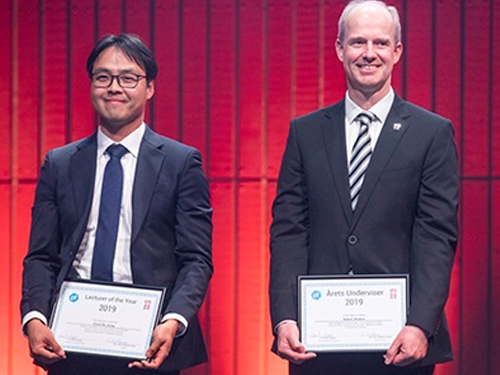 Professor Cheol-Ho Jeong Honored with the DTU Lecturer of the Year
A KAIST alumnus and an associate professor at the Technical University of Denmark (DTU), Dr. Cheol-Ho Jeong was selected as the recipient of the Lecturer of the Year 2019 Award by DTU.
Professor Jeong received his B.S., M.Sc., and Ph. D. degrees from KAIST’s Department of Mechanical Engineering in August 2007 under the supervision of Professor Jeong-Guon Ih, and has been serving as an assistant followed by associate professor at DTU’s Department of Electrical Engineering since October 2007. His research covers wide arrays of architectural acoustics, environmental acoustics, psychoacoustics, and structural acoustics. Every year, the students at DTU nominate one or two lecturer(s) of the year. The award celebrates and honors the selected lecturers for showing great commitment not only to education itself, but also to their communication and engagement with the students.
This year, the DTU student union Polyteknisk Forening nominated Professor Jeong for his outstanding course evaluations for his excellent teaching over the years. One of the student testimonies for the award read, "Professor Jeong is one of the best teachers I have ever had at DTU. He is very humane and approachable."
The awards ceremony was held on May 3 at DTU during the 2019 Annual Commemoration Party and Professor Jeong was warmly congratulated by the Crown Prince Couple of Denmark. The other award was given to Professor Robert Madsen from DTU’s Chemistry department.
©Photo and Quote: Ulrik Jantzen, Büro Jantzen, Camilla Christiane Hermann.
2019.05.30 View 9024
Professor Cheol-Ho Jeong Honored with the DTU Lecturer of the Year
A KAIST alumnus and an associate professor at the Technical University of Denmark (DTU), Dr. Cheol-Ho Jeong was selected as the recipient of the Lecturer of the Year 2019 Award by DTU.
Professor Jeong received his B.S., M.Sc., and Ph. D. degrees from KAIST’s Department of Mechanical Engineering in August 2007 under the supervision of Professor Jeong-Guon Ih, and has been serving as an assistant followed by associate professor at DTU’s Department of Electrical Engineering since October 2007. His research covers wide arrays of architectural acoustics, environmental acoustics, psychoacoustics, and structural acoustics. Every year, the students at DTU nominate one or two lecturer(s) of the year. The award celebrates and honors the selected lecturers for showing great commitment not only to education itself, but also to their communication and engagement with the students.
This year, the DTU student union Polyteknisk Forening nominated Professor Jeong for his outstanding course evaluations for his excellent teaching over the years. One of the student testimonies for the award read, "Professor Jeong is one of the best teachers I have ever had at DTU. He is very humane and approachable."
The awards ceremony was held on May 3 at DTU during the 2019 Annual Commemoration Party and Professor Jeong was warmly congratulated by the Crown Prince Couple of Denmark. The other award was given to Professor Robert Madsen from DTU’s Chemistry department.
©Photo and Quote: Ulrik Jantzen, Büro Jantzen, Camilla Christiane Hermann.
2019.05.30 View 9024 -
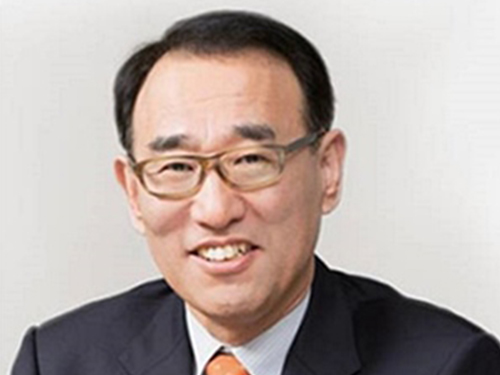 Professor Yim Decorated with the Chongjo Order of Merit
Professor Yong-Taek Yim from the Department of Mechanical Engineering was awarded the highest order of merit, the “Chongjo Keunjong Medal,” bestowed to public officials by the government in celebration of Invention Day on May 27.
Professor Yim was recognized for his innovative achievements to increase royalty income by introducing an IP-based management system at the Korean Institute of Machinery & Materials. He served as the president of KIMM for three years from 2014.
His idea led to new approaches to help explore diverse revenue creating sources such as dividend earnings and share sales, apart from simply relying on technology transfer fees. His efforts to disseminate the in-house R&D results also led to the foundation of six tech-based startups and spinoffs, which generated 11.2 billion KRW in sales. He also helped set up three spinoffs abroad.
Professor Yim said, “I pushed employee invention as a new value creator at KIMM. I thank each and every researcher and staff member at KIMM who worked so hard to create such an innovative IP-based R&D environment.”
2019.05.28 View 9055
Professor Yim Decorated with the Chongjo Order of Merit
Professor Yong-Taek Yim from the Department of Mechanical Engineering was awarded the highest order of merit, the “Chongjo Keunjong Medal,” bestowed to public officials by the government in celebration of Invention Day on May 27.
Professor Yim was recognized for his innovative achievements to increase royalty income by introducing an IP-based management system at the Korean Institute of Machinery & Materials. He served as the president of KIMM for three years from 2014.
His idea led to new approaches to help explore diverse revenue creating sources such as dividend earnings and share sales, apart from simply relying on technology transfer fees. His efforts to disseminate the in-house R&D results also led to the foundation of six tech-based startups and spinoffs, which generated 11.2 billion KRW in sales. He also helped set up three spinoffs abroad.
Professor Yim said, “I pushed employee invention as a new value creator at KIMM. I thank each and every researcher and staff member at KIMM who worked so hard to create such an innovative IP-based R&D environment.”
2019.05.28 View 9055 -
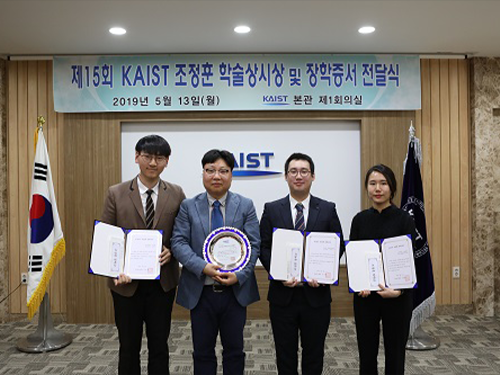 Professor Park at UPC-Barcelona Tech Receives Jeong Hun Cho Award
Professor Hyuk Park was honored to be the recipient of the Jeong Hun Cho Award which was presented at the Universitat Politècnica de Catalunya Barcelona Tech. The award recognizes young scientists in the field of aerospace engineering.
Professor Park, a graduate of KAIST’s Department of Mechanical Engineering in 2001, earned his MS and PhD at the Gwangju Institute of Science and Technology, and works at the Castelldefels School of Telecommunications and Aerospace Engineering at UPC-Barcelona Tech. He won this year’s award, which honors former PhD candidate Jeong Hun Cho at the Aerospace Engineering Department who died in a lab accident in 2003. Professor Park also received 25 million KRW prize money. Cho’s family endowed the award and scholarship in his memory. Since 2005, the scholarship has selected three young scholars every year who specialize in aerospace engineering from Cho’s alma maters of KAIST, Korea University, and Kongju National University High School.
Professor Park was selected as this year’s awardee in recognition of his studies of synthetic-aperture radar (SAR) satellite radiometer system, remote sensing radio frequency interference reduction system development, and 3CAT series research.
The Award Committee also chose three students for scholarships: PhD candidate Sang-Woo Chung from the Department of Aerospace Engineering at KAIST with 4 million KRW, PhD candidate Eun-Hee Kang from the School of Mechanical Engineering at Korea University with 4 million KRW, and Chan-Ho Song from Kongju National University High School with 3 million KRW.
2019.05.14 View 9769
Professor Park at UPC-Barcelona Tech Receives Jeong Hun Cho Award
Professor Hyuk Park was honored to be the recipient of the Jeong Hun Cho Award which was presented at the Universitat Politècnica de Catalunya Barcelona Tech. The award recognizes young scientists in the field of aerospace engineering.
Professor Park, a graduate of KAIST’s Department of Mechanical Engineering in 2001, earned his MS and PhD at the Gwangju Institute of Science and Technology, and works at the Castelldefels School of Telecommunications and Aerospace Engineering at UPC-Barcelona Tech. He won this year’s award, which honors former PhD candidate Jeong Hun Cho at the Aerospace Engineering Department who died in a lab accident in 2003. Professor Park also received 25 million KRW prize money. Cho’s family endowed the award and scholarship in his memory. Since 2005, the scholarship has selected three young scholars every year who specialize in aerospace engineering from Cho’s alma maters of KAIST, Korea University, and Kongju National University High School.
Professor Park was selected as this year’s awardee in recognition of his studies of synthetic-aperture radar (SAR) satellite radiometer system, remote sensing radio frequency interference reduction system development, and 3CAT series research.
The Award Committee also chose three students for scholarships: PhD candidate Sang-Woo Chung from the Department of Aerospace Engineering at KAIST with 4 million KRW, PhD candidate Eun-Hee Kang from the School of Mechanical Engineering at Korea University with 4 million KRW, and Chan-Ho Song from Kongju National University High School with 3 million KRW.
2019.05.14 View 9769 -
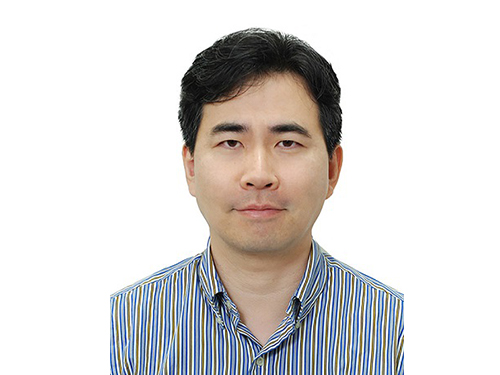 First Korean Member of OceanObs' Organizing Committee
Professor Sung Yong Kim from the Department of Mechanical Engineering became the first Korean to be elected as an organizing committee member of the international conference OceanObs’19’, specializing in the ocean observing field.
Professor Kim has been actively engaged in advisory panels, technical committees, and working groups for the North Pacific Marine Science Organization (PICES). Through numerous activities, he was recognized for his professionalism and academic achievements, which led him to be appointed as a member of the organizing committee.
The organizing committee is comprised of leading scholars and researchers from 20 countries, and Professor Kim will be the first Korean scientist to participate on the committee.
Since 1999, the conference has been held every decade. Global experts specializing in oceanic observation gather to discuss research directions for the next ten years by monitoring physical, biological, and chemical variables in regional, national, and global oceans and applying marine engineering.
This year, approximately 20 institutes including NASA’s Jet Propulsion Laboratory (JPL), the National Science Foundation, the National Oceanic and Atmospheric Administration, and the European Space Agency will support funds as well as high-tech equipment to the conference.
This year’s conference theme is the governance of global ocean observing systems such as underwater gliders, unmanned vehicles, remote sensing, and observatories. The conference will hold discussions on monitoring technology and information systems to ensure human safety as well as to develop and preserve food resources. Additionally, participants will explore ways to expand observational infrastructures and carry out multidisciplinary approaches.
There will also be collaborations with the Global Ocean Observing System (GOOS) and the Partnership for Observation of the Global Oceans (POGO) to organize ocean observing programs and discuss priorities.
Finally, they will set a long-term plan for solving major scientific issues, such as climate change, ocean acidification, energy, and marine pollution.
Professor Kim said, “Based on the outcomes drawn from the conference, I will carry out research on natural disasters and climate change monitoring by using unmanned observing systems. I will also encourage more multidisciplinary research in this field.”
2019.01.25 View 13913
First Korean Member of OceanObs' Organizing Committee
Professor Sung Yong Kim from the Department of Mechanical Engineering became the first Korean to be elected as an organizing committee member of the international conference OceanObs’19’, specializing in the ocean observing field.
Professor Kim has been actively engaged in advisory panels, technical committees, and working groups for the North Pacific Marine Science Organization (PICES). Through numerous activities, he was recognized for his professionalism and academic achievements, which led him to be appointed as a member of the organizing committee.
The organizing committee is comprised of leading scholars and researchers from 20 countries, and Professor Kim will be the first Korean scientist to participate on the committee.
Since 1999, the conference has been held every decade. Global experts specializing in oceanic observation gather to discuss research directions for the next ten years by monitoring physical, biological, and chemical variables in regional, national, and global oceans and applying marine engineering.
This year, approximately 20 institutes including NASA’s Jet Propulsion Laboratory (JPL), the National Science Foundation, the National Oceanic and Atmospheric Administration, and the European Space Agency will support funds as well as high-tech equipment to the conference.
This year’s conference theme is the governance of global ocean observing systems such as underwater gliders, unmanned vehicles, remote sensing, and observatories. The conference will hold discussions on monitoring technology and information systems to ensure human safety as well as to develop and preserve food resources. Additionally, participants will explore ways to expand observational infrastructures and carry out multidisciplinary approaches.
There will also be collaborations with the Global Ocean Observing System (GOOS) and the Partnership for Observation of the Global Oceans (POGO) to organize ocean observing programs and discuss priorities.
Finally, they will set a long-term plan for solving major scientific issues, such as climate change, ocean acidification, energy, and marine pollution.
Professor Kim said, “Based on the outcomes drawn from the conference, I will carry out research on natural disasters and climate change monitoring by using unmanned observing systems. I will also encourage more multidisciplinary research in this field.”
2019.01.25 View 13913 -
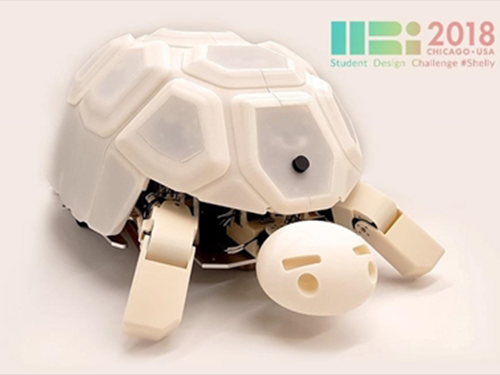 KAIST Student Wins HRI Student Design Competition
(From left: Jason Jangho Choi, Hyunjin Ku and Wonkyung Do)
Hyunjin Ku from the Department of Mechanical Engineering won the first prize at the Student Design Competition of Human-Robot-Interaction (HRI) 2018 which was held in Chicago.
Ku teamed up with undergrad students from Seoul National University (Jason Jangho Choi, Soomin Lee, Sunho Jang, and Wonkyung Do) and submitted Shelly, a tortoise-like robot for one-to-many interactions with children.
Figure 1. Shelly, a tortoise-like robot for one-to-many interactions with children
In the Student Design Competition of the HRI, students from around the globe can submit designs for their interactive robotic objects. The competition focused on human-agent interactions and practical applications.
Ku conducted the research while doing an internship at NAVER Labs. Her research on learning robot abuse with Shelly was published in IEEE Spectrum.
[YTN Science]
https://www.youtube.com/watch?v=n5KVwgBk0wk
[HRI 2018 Website]
http://humanrobotinteraction.org/2018/sdc/
[IEEE Spectrum]
https://spectrum.ieee.org/automaton/robotics/robotics-hardware/shelly-robotic-tortoise-helps-kids-learn-that-robot-abuse-is-a-bad-thing
2018.07.02 View 9805
KAIST Student Wins HRI Student Design Competition
(From left: Jason Jangho Choi, Hyunjin Ku and Wonkyung Do)
Hyunjin Ku from the Department of Mechanical Engineering won the first prize at the Student Design Competition of Human-Robot-Interaction (HRI) 2018 which was held in Chicago.
Ku teamed up with undergrad students from Seoul National University (Jason Jangho Choi, Soomin Lee, Sunho Jang, and Wonkyung Do) and submitted Shelly, a tortoise-like robot for one-to-many interactions with children.
Figure 1. Shelly, a tortoise-like robot for one-to-many interactions with children
In the Student Design Competition of the HRI, students from around the globe can submit designs for their interactive robotic objects. The competition focused on human-agent interactions and practical applications.
Ku conducted the research while doing an internship at NAVER Labs. Her research on learning robot abuse with Shelly was published in IEEE Spectrum.
[YTN Science]
https://www.youtube.com/watch?v=n5KVwgBk0wk
[HRI 2018 Website]
http://humanrobotinteraction.org/2018/sdc/
[IEEE Spectrum]
https://spectrum.ieee.org/automaton/robotics/robotics-hardware/shelly-robotic-tortoise-helps-kids-learn-that-robot-abuse-is-a-bad-thing
2018.07.02 View 9805 -
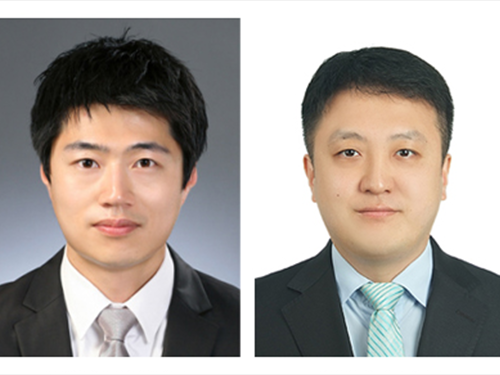 KAISTians Receive Future Ocean Science and Technology Awards
(From left: PhD candidates Minseok Kang and Junkeon Ahn)
PhD candidates Minseok Kang and Junkeon Ahn from the Department of Mechanical Engineering received Future Ocean Science and Technology Awards from the Korean Association of Ocean Science and Technology Societies (KAOSTS).
Since 2017, KAOSTS has conferred this award upon graduate students who have published outstanding papers on ocean science and technology in order to encourage young researchers in this area.
Kang published ‘Ship block assembly sequence planning considering productivity and welding deformation’ in Naval Architecture and Ocean Engineering in which he proposed an assembly sequence planning method for block assemblies that considers the geometric characteristics of blocks to determine feasible assembly sequences as well as assembly process and productivity factors.
Ahn published ‘Fuzzy-based FMEA of hybrid MCFC and gas turbine system for marine propulsion’ in Power Sources. In this research, he conducted a study proposing a fuzzy-based failure mode and effect analysis (FMEA) for a hybrid molten carbonate fuel cell and gas turbine system for liquefied hydrogen tankers.
2018.06.15 View 9775
KAISTians Receive Future Ocean Science and Technology Awards
(From left: PhD candidates Minseok Kang and Junkeon Ahn)
PhD candidates Minseok Kang and Junkeon Ahn from the Department of Mechanical Engineering received Future Ocean Science and Technology Awards from the Korean Association of Ocean Science and Technology Societies (KAOSTS).
Since 2017, KAOSTS has conferred this award upon graduate students who have published outstanding papers on ocean science and technology in order to encourage young researchers in this area.
Kang published ‘Ship block assembly sequence planning considering productivity and welding deformation’ in Naval Architecture and Ocean Engineering in which he proposed an assembly sequence planning method for block assemblies that considers the geometric characteristics of blocks to determine feasible assembly sequences as well as assembly process and productivity factors.
Ahn published ‘Fuzzy-based FMEA of hybrid MCFC and gas turbine system for marine propulsion’ in Power Sources. In this research, he conducted a study proposing a fuzzy-based failure mode and effect analysis (FMEA) for a hybrid molten carbonate fuel cell and gas turbine system for liquefied hydrogen tankers.
2018.06.15 View 9775 -
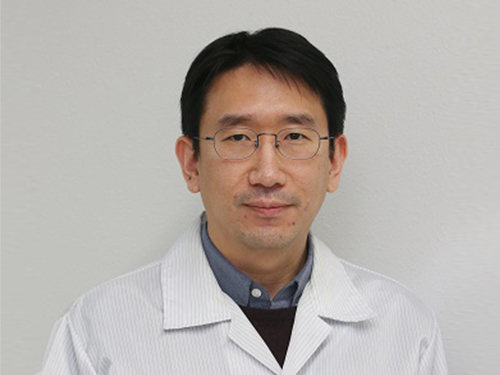 Professor Jungwon Kim Wins Haerim Optics and Photonics Award
(Professor Jungwon Kim)
Professor Jungwon Kim from the Department of Mechanical Engineering received the 8th Haerim Optics and Photonics Award from the Optical Society of Korea (OSK).
He was recognized for his dedication to pioneering the field of microwave photonics by developing ultra-low noise fiber photonics lasers.
The Haerim Optics and Photonics Award is given to an outstanding researcher who has made academic contributions in the field of optics and photonics for the last five years.
The name of the award (Haerim) comes from the pen-name of the renowned scholar, Professor Un-Chul Paek, because it is maintained using funds he contributed to the OSK.
The OSK will confer the award on February 8 during the 29th OSK Annual Meeting and Winter Conference of 2018.
2018.02.07 View 9651
Professor Jungwon Kim Wins Haerim Optics and Photonics Award
(Professor Jungwon Kim)
Professor Jungwon Kim from the Department of Mechanical Engineering received the 8th Haerim Optics and Photonics Award from the Optical Society of Korea (OSK).
He was recognized for his dedication to pioneering the field of microwave photonics by developing ultra-low noise fiber photonics lasers.
The Haerim Optics and Photonics Award is given to an outstanding researcher who has made academic contributions in the field of optics and photonics for the last five years.
The name of the award (Haerim) comes from the pen-name of the renowned scholar, Professor Un-Chul Paek, because it is maintained using funds he contributed to the OSK.
The OSK will confer the award on February 8 during the 29th OSK Annual Meeting and Winter Conference of 2018.
2018.02.07 View 9651 -
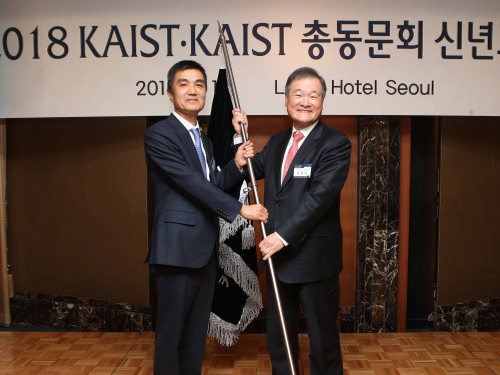 Harnessing the Strength of KAIST Alumni: New Head of KAA Inaugurated
KAIST alumni gathered in Seoul on January 13 to celebrate the New Year and the newly-elected leadership of the KAIST Alumni Association (KAA). More than 300 alumni, including President Sung-Chul Shin who is also an alumnus of KAIST, joined the gala event held at the Lotte Hotel.
Photo: Ki-Chul Cha(left) and Jung Sik Koh(right)
The KAA inaugurated its new president, Ki-Chul Cha, who was preceded by Jung Sik Koh, the former CEO at the Korea Resources Corporation. His term starts from January 2018 to December 2020.
Cha is the CEO of Inbody Co Ltd., a global company specializing in developing and selling medical instruments, such as a body composition analyzers, and medical solutions. He is also an adjunct professor in the Department of Mechanical Engineering at Yonsei University. Cha obtained a master’s degree in Mechanical Engineering at KAIST in 1980, and a Ph.D. in Bioengineering at the University of Utah, before finishing his post-doc fellowship at Harvard Medical School.
Cha plans to explore the idea that alumni engagement, saying, “KAIST stays as a home in the memories of 60,000 alumni. I will dedicate myself to stimulating the alumni association to make KAISTians proud.”
At the gala event, the KAA awarded the Alumni of the Year honor to six alumni who distinguished themselves in the areas of professional achievement, humanitarianism, and public service. They are the Director of Startup KAIST Professor Byoung Yoon Kim; President of LG Chem Ltd and Head of Battery Research and Development Myung Hwan Kim; Director of INNOX Advanced Materials Co., Ltd Kyung Ho Chang; Vice President of the Korea International Trade Association Jung-Kwan Kim; CEO of Samsung Electro-Mechanics Yun-Tae Lee; and CEO of ENF Technology Jinbae Jung.
Photo: President Shin(far right) poses with six awardees of the Distinguished Alumni Award and the former President of KAA, Koh(far left)
2018.01.16 View 12680
Harnessing the Strength of KAIST Alumni: New Head of KAA Inaugurated
KAIST alumni gathered in Seoul on January 13 to celebrate the New Year and the newly-elected leadership of the KAIST Alumni Association (KAA). More than 300 alumni, including President Sung-Chul Shin who is also an alumnus of KAIST, joined the gala event held at the Lotte Hotel.
Photo: Ki-Chul Cha(left) and Jung Sik Koh(right)
The KAA inaugurated its new president, Ki-Chul Cha, who was preceded by Jung Sik Koh, the former CEO at the Korea Resources Corporation. His term starts from January 2018 to December 2020.
Cha is the CEO of Inbody Co Ltd., a global company specializing in developing and selling medical instruments, such as a body composition analyzers, and medical solutions. He is also an adjunct professor in the Department of Mechanical Engineering at Yonsei University. Cha obtained a master’s degree in Mechanical Engineering at KAIST in 1980, and a Ph.D. in Bioengineering at the University of Utah, before finishing his post-doc fellowship at Harvard Medical School.
Cha plans to explore the idea that alumni engagement, saying, “KAIST stays as a home in the memories of 60,000 alumni. I will dedicate myself to stimulating the alumni association to make KAISTians proud.”
At the gala event, the KAA awarded the Alumni of the Year honor to six alumni who distinguished themselves in the areas of professional achievement, humanitarianism, and public service. They are the Director of Startup KAIST Professor Byoung Yoon Kim; President of LG Chem Ltd and Head of Battery Research and Development Myung Hwan Kim; Director of INNOX Advanced Materials Co., Ltd Kyung Ho Chang; Vice President of the Korea International Trade Association Jung-Kwan Kim; CEO of Samsung Electro-Mechanics Yun-Tae Lee; and CEO of ENF Technology Jinbae Jung.
Photo: President Shin(far right) poses with six awardees of the Distinguished Alumni Award and the former President of KAA, Koh(far left)
2018.01.16 View 12680